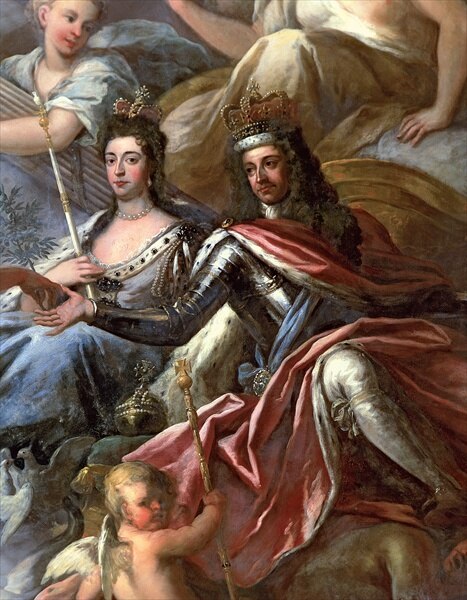Anne Finch, Countess of Winchilsea
Anne Finch, Countess of Winchilsea, was an English poet and courtier. Finch wrote in many genres and on many topics - including fables, odes, songs, and religious verse - which are informed by "political ideology, religious orientation, and aesthetic sensibility". Her works also allude to other female authors of the time, such as Aphra Behn and Katherine Phillips. Through her commentary on the mental and spiritual equality of the sexes and the importance of women fulfilling their potential as a moral duty to themselves and to society, she is regarded as one of the integral female poets of the Augustan Era. Finch died in Westminster in 1720 and was buried at her home at Eastwell, Kent.
Portrait miniature by Peter Cross (c. 1690–1700)
William and Mary
Title page of Miscellany Poems, on Several Occasions, published in 1713.
Aphra Behn was an English playwright, poet, prose writer and translator from the Restoration era. As one of the first English women to earn her living by her writing, she broke cultural barriers and served as a literary role model for later generations of women authors. Rising from obscurity, she came to the notice of Charles II, who employed her as a spy in Antwerp. Upon her return to London and a probable brief stay in debtors' prison, she began writing for the stage. She belonged to a coterie of poets and famous libertines such as John Wilmot, Lord Rochester. Behn wrote under the pastoral pseudonym Astrea. During the turbulent political times of the Exclusion Crisis, she wrote an epilogue and prologue that brought her legal trouble; she thereafter devoted most of her writing to prose genres and translations. A staunch supporter of the Stuart line, Behn declined an invitation from Bishop Burnet to write a welcoming poem to the new king William III. She died shortly after.
Behn c. 1670
A sketch of Aphra Behn by George Scharf from a portrait believed to be lost (1873)
Portrait by Mary Beale
Title page of the first edition of Oroonoko (1688)







